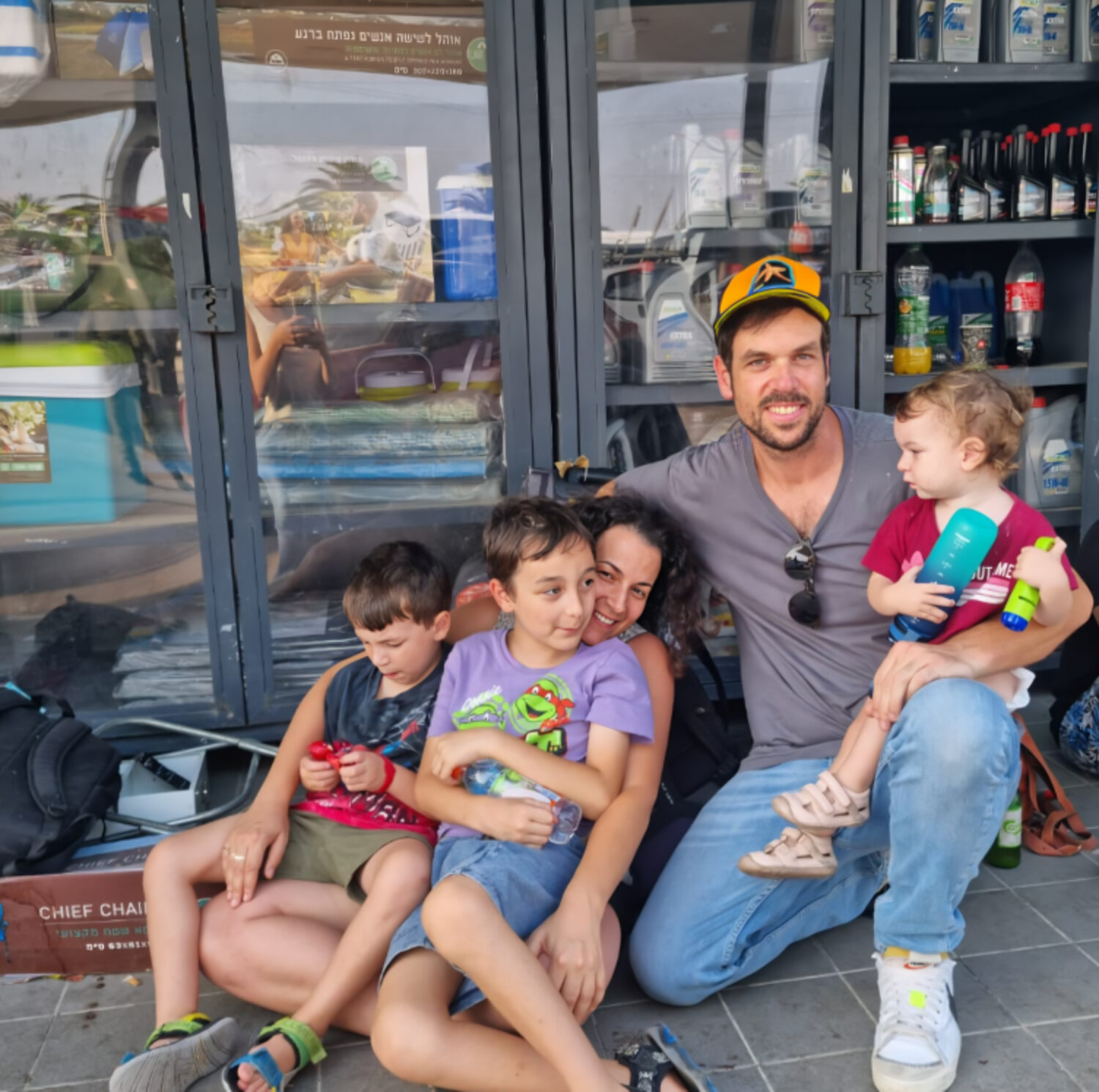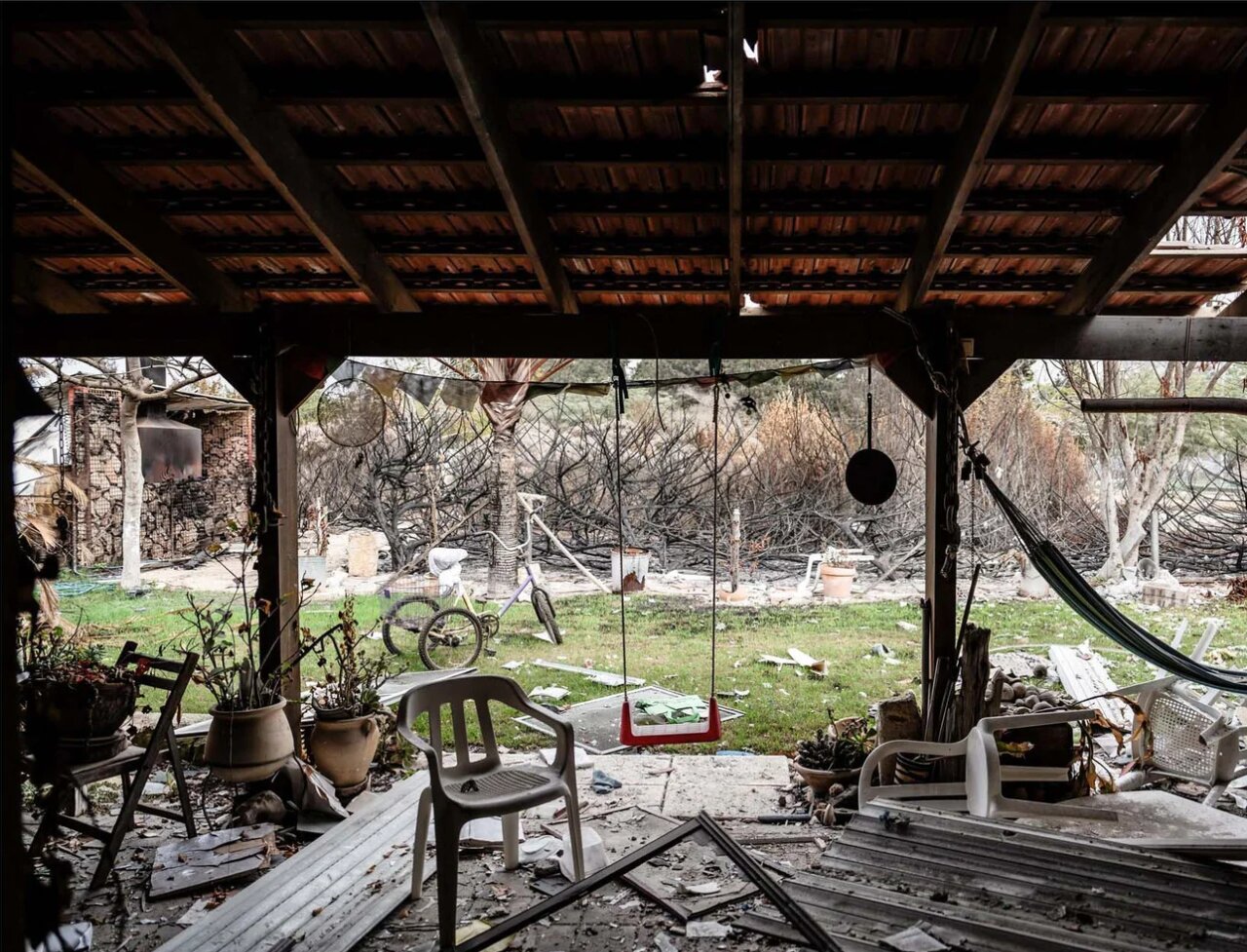Monday, April 29, 2024
 66.0°,
Shallow Fog
66.0°,
Shallow Fog
Survivors of Kfar Aza, an Israeli kibbutz, speak in Lynbrook

Amit and Tomer Ades decorated their home in the beginning of October to celebrate their son’s fifth birthday. What they didn’t prepare for was celebrating his birthday in a safe room while hearing gunfire outside draw closer and closer.
Oct. 7 was a dreadful day for the Ades family and their kibbutz, Kfar Aza, in Israel. Amit and Tomer, along with their three children, Ori, 7, Shir, 5, and Ellie, 1, narrowly escaped Hamas’ attack on their community, which is about a mile from the Gaza border. On March 17, neighbors gathered at Temple Am Echad, in Lynbrook, to listen to Amit and Tomer recount their harrowing experience.
They came to Lynbrook via a campaign with Salanter Akiba Riverdale Academy, a private, modern Orthodox Jewish day school in New York City. The campaign, dubbed the “Kfar Aza Awareness Campaign,” sponsored Amit and Tomer to travel to the states and talk about their experience.
When Tova Markowitz, a close friend of a family member of Amit and Tomer, heard that they were coming to speak in the United States at universities, law firms and community centers, she suggested that they should speak in her community, at the Lynbrook temple. The last-minute trip to Lynbrook last month drew a large crowd, as locals learned about the horrors that Amit and Tomer had gone through five months earlier.
The Ades family lived in the center of the kibbutz along with about 800 others. Being so close to Gaza, the kibbutz was one of the first places to be attacked in the early morning of Oct. 7. Amit also explained that because she lives near a weapons cache, a place where first defenders keep weapons safe until the IDF arrives; her home was in a danger zone.
“We think they knew about this place because they were coming very fast to our house,” Amit said.
At 6:30 a.m., alarms blared throughout the village, letting the residents know that there is an ongoing attack. Amit said that when she woke up, she heard very strong, nonstop bombing. Less than 10 minutes after the first alarm played, there was shooting right outside of her home.
“My husband, myself, and our three young children were in the home and we had no one to call for help,” Amit said. “So we started chatting in our kibbutz’ What’s App group chat and people were saying that we should lock ourselves in the safe room.”
Amit and Tomer’s safe room is also their kid’s bedroom. Without trying to panic them, they closed the bedroom door. However, the door did not have a lock on it, so they created a barrier, using a measurement tool that was on their wall.
By 6:45 a.m., the Ades family huddled together in the safe room, holding the door shut, as they heard shooting, grenades, and the constant bombardment of munitions.
At 9 a.m., one of Amit and Tomer’s friends sent a message in the group chat, asking anyone to help her husband, who was shot. The message mentioned that he was losing a lot of blood and he was just outside of Amit and Tomer’s home. Tomer went outside to try to find him.
“Of course I didn’t want him to leave, as I was hearing what was going on outside, but I stayed in the home with our three children,” Amit said. “I stood at the entrance of the room with our baby in one hand to try to keep her quiet and I had a kitchen knife in the other hand.”
With what, according to Amit, felt like forever, Tomer came back to the house and told her that he couldn’t see the man. He left again, but this time from their backdoor, and as soon as he got outside, he rushed back in the house.
“He came back inside the house and said ‘I don’t want to put more pressure, but this is what I saw so we have to be quiet inside the house’,” Amit said.
Tomer said he heard about 20 to 30 terrorists yelling.
Around 10 a.m., Amit said that she lost electricity in her home, which created an unsafe environment inside the safe room, as it started to get very hot with little to no ventilation. When they cracked open the door to get some air circulating, Amit said that they started to smell gunpowder. She told Tomer that it’s not safe to breathe this in, but Tomer said ‘it’s better than to suffocate.’
For the next few hours, Tomer periodically left the room to get food for the kids and a bucket for them to go to the bathroom. Amit said that every time Tomer left the room, she stood at the entrance of the room, guarding it. This was the routine that the Ades family was in for the next 36 hours.
During the afternoon, Amit said that they started to lose cellular reception. She explained that the army turned it off because the terrorists were using to communicate with one another.
“I already sent my parents a goodbye message because I didn’t think that we were going to make it.”
Amit said that in a kibbutz, people typically don’t lock their doors. She said that she doesn’t even have a key to her home. Therefore, she and Tomer took all the furniture that they had in the house and put two piles of chairs in front of both entrances.
“On top of that, we put some pots so it will make a lot of noise if someone entered,” Amit said.
As they tried getting some sleep, Amit said that the room began to get hot again. She opened the window in the safe room, which has metal in front of it to stop bullets from entering the room. The window is also noise cancelling so when she opened it, the entire room instantly became very noisy with sounds of gunfire.
The family survived through the night and on Oct. 8, they celebrated Shir’s birthday by eating some of the cake that they had saved for his celebration.
Tomer and Amit made it their mission to not instill any fear in their kids. The older children were distracted by the fighting, as they spent most of their time on their iPad.
Amit mentioned that one of her children accidentally downloaded the SpongeBob Movie before this attack so when the internet kept going off, they kept watching the movie over and over. The movie’s runtime was one hour and 41 minutes and for Amit, that number is still fresh in her mind today.
“They watched the movie at least eight times,” Amit said. “Every time they finished, we told them to watch it again and again.”
By Sunday morning, Amit asked herself, ‘why is nobody coming?’ She noted that the IDF was nowhere to be found.
“Two hours, four hours, six hours, night, morning no one is coming,” Amit said.
At noon on Sunday, Amit went around the house with Tomer and saw bullet holes, shattered glass, and debris in various rooms.
“Then on Sunday afternoon, Tomer told me that we have to eat proper food and that we can’t eat anymore of the cake,” Amit said.
Tomer went to the kitchen to cook boiled eggs and Amit noted that she started to hear the gunfire get closer and closer. They went back into the safe room, put the barriers back up, and stood at the entrance of the room with kitchen knives in both of their hands.
“Tomer tells me that if they come in the house, take the knife and aim for the neck,” Amit said.
Suddenly, Amit heard the pots fall.
“We kind of all said our goodbyes and then they came inside the house shooting,” Amit said.
Amit said she heard one of the people say the word ‘clear’ in Hebrew. Amit started yelling “13” because that was the number of the Israeli rescue team that, according to What’s App, was saving people at the start of the attack.
“They shouted at us ‘who are you?’ ‘What are your names?’ ‘What are your parents names?’ What is your ID number?’” Amit said. “And then they said ‘we’re opening the door, have nothing in your hands’ so we kind of dropped the knives and they opened the door.”
With the rifles aimed straight at Amit and Tomer, Amit said that she was both thankful that she was being saved by the IDF, but confused as to why they were pointing the guns at them.
“They told us that we have piles of bodies and blood on our front yard and because we had no connection for more than 24 hours, our household was considered dead,” Amit said.
“They weren’t coming for us, but they were coming to fight terrorists, which is why they entered the house shooting.”
A tank arrived to take them to a safer area. One of the commanders told Amit to tell her kids to not look around because of the dead bodies on the ground.
Amit saw a body lying right next to the safe room’s window and she later learned that the body was one of her and Tomer’s closest friends. He died alongside six other of Amit and Tomer friends. In total, Amit said 64 people from her kibbutz were murdered on that Saturday and 25 people were kidnapped.
Currently, Amit and her family are staying in a hotel in central Israel until September, where they will move into a temporary settlement in southern Israel. Then two years after that, they will be back in Kfar Aza.
Amit said that people in the states can help her and other survivors like her by putting pressure to release the hostages. She said that when she moves to southern Israel, there will be more volunteer opportunities for people to help with mental health treatments, and general support for the children impacted by this war.
HELP SUPPORT LOCAL JOURNALISM
The worldwide pandemic has threatened many of the businesses you rely on every day, but don’t let it take away your source for local news. Now more than ever, we need your help to ensure nothing but the best in hyperlocal community journalism comes straight to you. Consider supporting the Herald with a small donation. It can be a one-time, or a monthly contribution, to help ensure we’re here through this crisis. To donate or for more information, click here.
Sponsored content
Other items that may interest you









